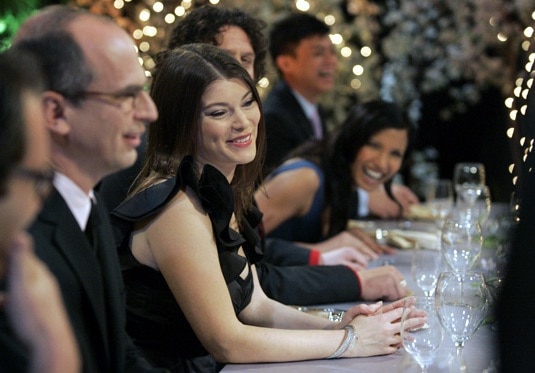Highs and Lows
James Oseland breaks down the hits and misses of the final meal ... and gets a little misty-eyed doing so.

Writing this blog post, my last for the season, is like pulling teeth. Why? Well, for starters being in the presence of such outstanding chefs working at the top of their game for so many weeks was an unforgettable experience, and it’s not easy to let it all go.
But even more difficult was going into the finale knowing that only one of the three finalists would walk away a winner. I realize that’s the nature of competition — humans are hardwired to want to watch a great contest and see a single victor emerge. Competition begets great performances, of course, and we love to see people striving to do their best. But picking a winner can sometimes entail some tough decisions.
Rick, Michael, Hubert: each one of the finalists was, I can say without hesitation, a master in the truest sense of that word. Having witnessed firsthand, with all my senses, what these chefs are capable of under pressure has been a gift. The thoughtfully conceived, cook-your-autobiography challenge in the final episode, perhaps more than any of the challenges that came before, brought that mastery into sharp relief. I tasted the food of cooks who had an innate, almost unconscious knowledge of the properties of their ingredients, of how those ingredients behaved in a pan or an oven, about what techniques and seasonings make them shine.
Another thing that sets Rick, Michael, and Hubert apart from the flock is what we didn’t see in the last episode: namely, over-caffeinated tempers — the kind we got a whiff of when Dale Talde attempted to trash talk Michael on Episode 9. Instead, what we witnessed firmly refutes the notion that yelling and insults have a place in the professional kitchen. Sure, there were high emotions in evidence — after all, these cooks were being asked to make dishes with which they had deep personal and sentimental connections — but those feelings, far from getting in the way of good cooking, brought these chefs closer to what the business of preparing a meal is all about: nourishing and giving pleasure to the eater. They proved that being a master is more than just being able to have total recall of a battery of techniques; it’s about knowing, in your heart, that cooking, not drama, is what kitchens are meant for.
As with all the previous episodes, there were a few misses and hits. The seafood in Rick’s arroz a la tumbada was overcooked; it was heartbreaking to witness the moment — when he pulled the half-sheet pan laden with overly steamed scallops and mussels from the oven — at which he realized that. The almost-hard garlic in the center of Hubert’s rack of lamb was a detriment to the dish; too bad he couldn’t have sensed its rawness in the same way most of us at the table had. Surely he would have blanched it for longer. And Michael’s deep-fried, and very bony, whole fish was ugly and hard to eat, while his second-course polenta (the dish with the, uh, vaguely bizarre, burned Saveur-page doilies) was for me aggressively over-salted. Was there too much Parmigiano-Reggiano in it?
But, oh, the hits! Rick’s mole poblano was soul-stirring; Hubert’s tender sweetbreads were divinity on a plate; and Michael’s braised short ribs were so succulent, so wine-y and unctuous, that it nearly called for physical restraint to stop eating them. All in all, these three chefs pulled off a grand, soulful feast that I will never forget. I know it’s a cliché to say it, but they were all, truly, winners. Rick just walked home with the prize.
Oh, boy. I’m getting all misty eyed — for the umpteenth time today. So, I’ll just add a few more words before I say goodbye.
I learned a lot of things during my time as a critic on Top Chef Masters — from little details like Rick teaching me that Mexican sweet, fresh-corn tamales never contain lard to larger ones like the fact that for me shiny black lapels should be a fashion no-no. But perhaps the most valuable lesson I took away from the whole experience was this: even in the highest-profile kitchens, the kind of humbleness that Rick, Michael, and Hubert exhibited is perhaps the most valuable skill of all. My hat goes off to you guys.
True confession: Another thing that makes writing this final blog post so difficult is that my cat Pete, my soul companion for the past 16 years, is sick with inoperable cancer. He’s sitting beside me here in my New York City apartment as I write these words, weak but stoically keeping on. It’s funny: being in his company is another reason the quality of humbleness has been on my mind. Like Rick, Michael, and Hubert, it’s something Pete also has in spades. Let’s all, please, say a prayer for the little man.



